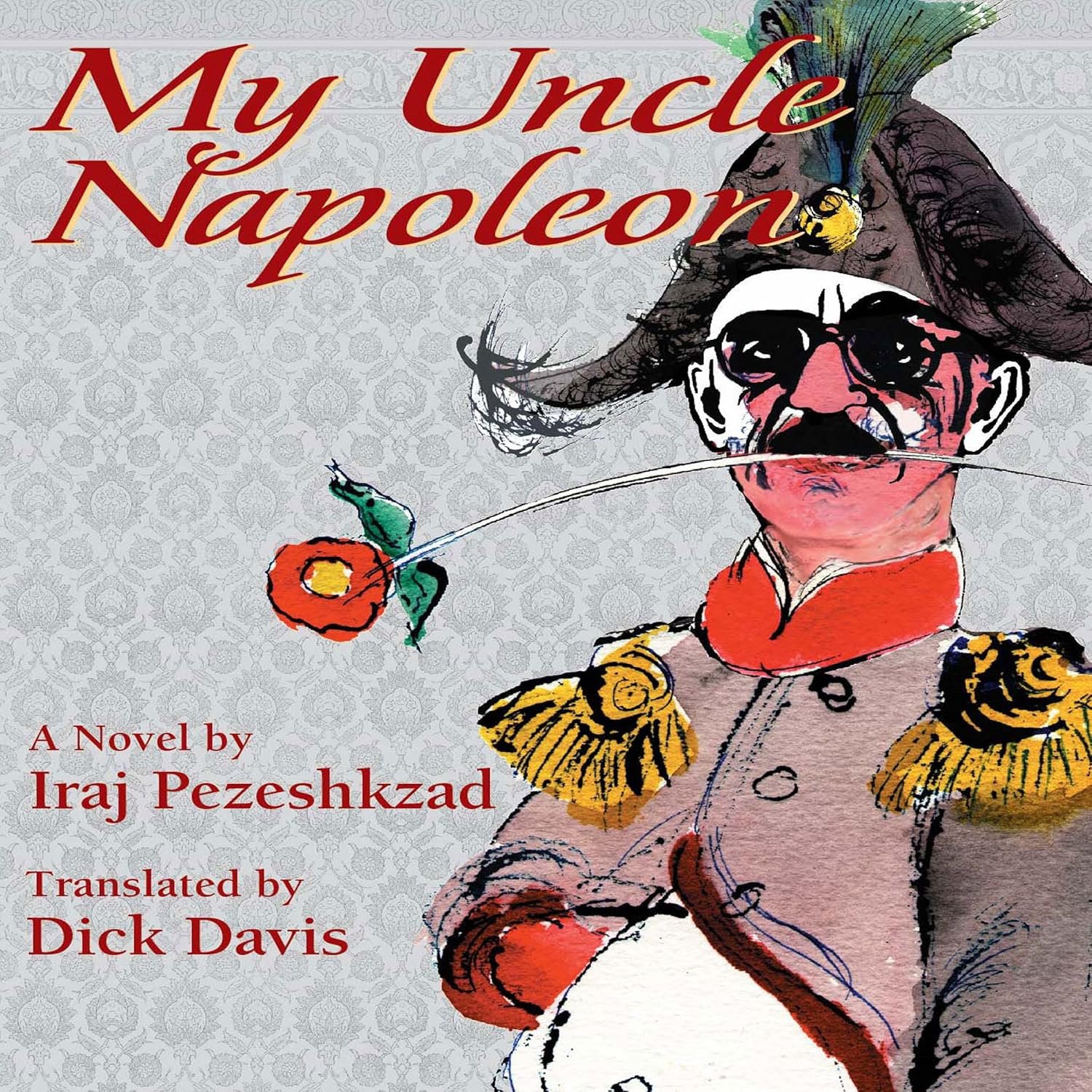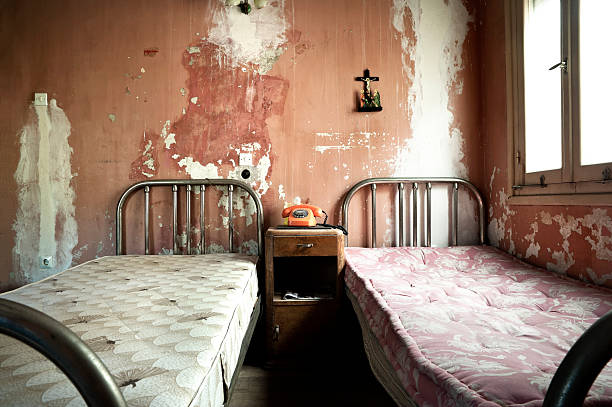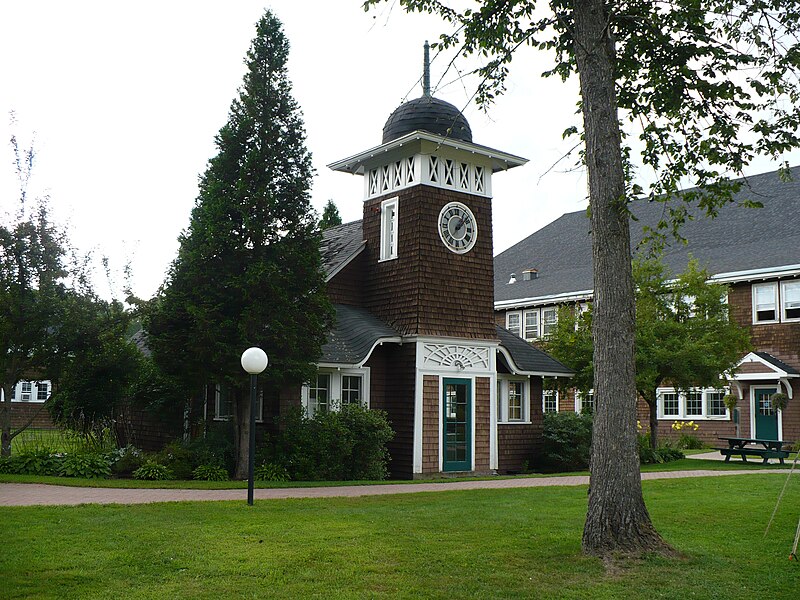- Reclaiming a Forgotten Cosmopolitanism
What if the most European comedy of manners in modern literature was not written in Paris or London, but in Tehran? Few works illustrate the strange global travels of laughter better than My Uncle Napoleon (Dā’i Jān Napoleon), the 1970s Iranian novel and television series that turned an entire generation’s self-image into satire. To Iranian audiences, its characters—boastful patriarchs, scheming servants, hapless lovers—feel entirely local. Yet to any reader versed in Western theatre, they appear uncannily familiar: direct descendants of the miles gloriosus and senexiratus of Roman comedy, the bourgeois hypocrites of Molière, and the bumbling dreamers of Cervantes.
Set in a sun-soaked Tehran courtyard during World War II, My Uncle Napoleon unfolds as a domestic farce within an extended Iranian aristocratic family. The story follows young Saeed, who falls in love with his cousin Leili, but their romance is continually thwarted by her father—the elderly patriarch “Uncle Napoleon,” who has delusions of grandeur and imagines himself a war hero like Napoleon locked in eternal battle with the British Empire. Around him swarm servants, relatives, and suitors, each ruled by vanity, gossip, and appetite. What begins as a family feud becomes a national allegory: an Iran obsessed with honor and conspiracy, forever mistaking domestic insecurity for foreign intrigue.
When Iraj Pezeshkzad published My Uncle Napoleon in 1970 and Nasser Taghvai adapted it for television a few years later, they transformed a domestic story into a modern social satire rooted in an older, trans-Mediterranean comic tradition. The result was a uniquely Iranian variation on the European comedy of manners: a satire as sharp as Tartuffe yet as tender as Don Quixote, exposing vanity, delusion, and the sweet absurdities of everyday life.
To recognize this genealogy is to rethink cultural geography itself. My Uncle Napoleon emerged from an Iran caught between inherited hierarchies and imported ideals—between the pride of tradition and the performance of modernity. Pezeshkzad’s satire pierced both worlds at once: it mocked the hollowness of inherited class pretensions, the greed of the emerging bourgeoisie, the lecherousness hiding behind respectability, and the paranoia of seeing invisible foreign hands behind every misfortune. Beneath the laughter lies a social x-ray of a nation in transition; one that exposes how universal the human comedy really is. Wherever pride masks insecurity or morality conceals appetite, the boastful soldier, the clever servant, and the foolish lover are still on stage.
- From Rome to Tehran: The Genealogy of Comic Reason
The true story of My Uncle Napoleon begins long before Iranian society ever encountered Europe. It begins in ancient Rome, where playwrights like Plautus and Terence first distilled the mechanics of social folly into recognizable human types: the miles gloriosus (boastful soldier), senexiratus (angry patriarch), adulescensamans (love-struck youth), and servuscallidus (clever servant) whose cunning unsettles hierarchies. These archetypes gave structure to the earliest comedies of manners; plays that laughed at pretension, greed, lust, and the self-importance of power while still affirming the messy vitality of life.
During the Renaissance, Italian dramatists revived this legacy under the banner of CommediaErudita—the “learned comedy.” Figures like Ariosto and Machiavelli infused Roman stock characters with humanist irony, turning the stage into a mirror of civic behavior. From there, the tradition migrated north: in seventeenth-century France, Molière refined it into the Comédie de Mœurs, the comedy of manners, giving the form its moral edge. Tartuffe, The Misanthrope, and The Miser revealed hypocrisy, avarice, and self-deception not as personal failings but as social diseases; symptoms of a class learning to appear virtuous while remaining self-interested.
When Pezeshkzad wrote My Uncle Napoleon in the early 1970s, he was consciously inserting Persian storytelling into this long comic continuum. His Tehran courtyard became a Roman street, his household a small-scale republic of vices and delusions. Dā’i Jān, the self-mythologizing veteran who sees British plots behind every misfortune, is a late descendant of the miles gloriosus; Mash Qāsem, the shrewd servant who manipulates his master’s vanity, is an Iranian servuscallidus. Around them orbit the angry patriarch, the hapless lover, and the scolding matron—the same ensemble that once animated the stages of Rome, Florence, and Paris.
The continuity is not imitation but translation. Each culture that inherits this comic grammar rewrites it according to its own anxieties. In Iran, it became a language for laughing at the contradictions of modern life: the self-importance of a decaying feudal hierarchy, the obsession with foreign conspiracies, and the uneasy coexistence of desire and decorum. Comedy here becomes what it has always been: a form of moral intelligence that survives empire, censorship, and time itself.
- Pezeshkzad and Taghvai: The Iranian Inheritors of Molière
If Molière’s theatre exposed the hypocrisies of seventeenth-century France, Pezeshkzad’s novel did the same for twentieth-century Iran — a society caught between traditional hierarchies and modern ideals, where decorum masked desire and progress coexisted with superstition. In tone and construction, My Uncle Napoleon belongs unmistakably to the Comédie de Mœurs tradition: it draws laughter from the collision between private vice and public virtue, turning social psychology into farce. But Pezeshkzad enriched this European legacy with Iranian vernacular humor—the rhythms of courtyard gossip, the sly double entendres of everyday speech, and the ironic intimacy of storytelling that makes ridicule feel affectionate.
The result is a comedy that is both learned and popular, erudita and bazari: a meeting between CommediaErudita’smoral intelligence and Iran’s own narrative realism. Structurally, it leans toward the picaresque—episodic, centrifugal, and deliberately excessive. The story meanders through subplots and side characters, each a recognizable “type” rather than a psychological portrait: the pompous patriarch, the sycophantic servant, the coquettish matron, the naive lover. This flatness is deliberate; it mirrors the moral flatness of a society performing roles rather than living truths. Like the wandering rogues of Don Quixote or the bawdy tricksters of the medieval fabliau, Pezeshkzad’s figures inhabit a comic world of perpetual mischief where nothing ever quite changes.
When Nasser Taghvai adapted the novel into a television series in 1976, he translated Pezeshkzad’s literary wit into cinematic rhythm. His lens preserved the theatrical ensemble of Molière while grounding it in the visual realism of Iranian life. Taghvai’s direction was domestic: narrow alleys, shaded courtyards, gossip over tea, gestures half-comic and half-melancholic. He fused two acting traditions—the classical discipline of veteran stage performers with the spontaneity of younger screen actors—to create an aesthetic both naturalistic and stylized. The result was something unprecedented in Iranian television: a comedy of manners that felt at once literary, theatrical, and utterly real.
What Pezeshkzad imagined and Taghvai realized was a distinctly Iranian modernitéthéâtrale—a space where laughter became critique, and critique became affection. They inherited Molière’s moral vision but replaced his courtly salons with middle-class courtyards, and his polished hypocrisy with moral self-deception. Out of that translation emerged not mere imitation but renewal: the human comedy, reborn in Iranian idiom.
- From Page to Screen: The Theatrical Modernism of Taghvai
When My Uncle Napoleon came to the small screen in 1976, it was reinvented for a whole new audience. Nasser Taghvai approached Pezeshkzad’s prose as a director of theatre might approach Molière—by treating every gesture, glance, and pause as moral syntax. The result was a subtle choreography of Iranian manners. Taghvai transformed types into living beings: Dā’i Jān’s delusional pride, Mash Qāsem’s cunning innocence, Aghājan’s hypocrisy, and AsadollāhMīrzā’s rakish charm all gained depth through performance and dialogue. What Pezeshkzad wrote with words, Taghvai composed in movement and tone.
His casting was itself an act of aesthetic fusion. Drawing from both the old guard of theatre and the new wave of Iranian cinema, Taghvai created an ensemble that embodied Iran’s own generational tension. The collision of these worlds produced something unique. The camera rarely strayed from the courtyard, yet within that confined space Taghvai built a full society: hierarchical, claustrophobic, and comic. The camera’s patient observation of domestic rituals gave the series its moral weight. Laughter arose both from punchlines and the small absurdities of habit: the way an eyebrow twitches in anger, how a teacup trembles in pride, or how an argument about honor spirals into farce. Through this vision, My Uncle Napoleon became a meditation on performance itself—on how societies, like actors, wear roles until they forget where the mask ends and the face begins.
- The Lost Modernity: Television, Society, and Self-Recognition
My Uncle Napoleon held up a mirror to a society in flux—a country negotiating the promises and failures of modernization, where imported ideals of progress had not erased older habits of hierarchy, superstition, and suspicion. For millions of viewers, the series was their own life projected back at them in comic form. The courtyards, gossip, and domestic rituals were familiar; what was new was the candor with which these ordinary settings revealed moral absurdities.
The show’s timing was uncanny. Iran was in the midst of an ambitious modernization campaign: rapid urbanization, mass education, and media expansion under an authoritarian regime that claimed to be forging a new age of progress. Yet beneath the façade of reform, contradictions festered—between public piety and private indulgence, between national pride and dependence on foreign validation, and between rational aspiration and inherited fatalism. My Uncle Napoleon exposed these tensions without moralizing. It showed how the same family that dreamed of modern life also clung to outdated feudal honor codes, how rationalism and superstition coexisted in the same space, and how every crisis was blamed on an English plot.
After the 1979 Revolution, the series disappeared from the airwaves; banned for its irreverence yet remembered through grainy recordings and whispered quotations. For many Iranians, it came to symbolize a lost moral and aesthetic balance: an age when one could still laugh at one’s own contradictions before tragedy made irony impossible.
- Universal Satire and the Politics of Self-Deception
At the heart of My Uncle Napoleon lies a syndrome more universal than national: the fear that someone else, somewhere, is secretly running the world. In that sense, Dā’i Jān’s conviction that “it’s all the work of the English” is comic because it captures a universal paranoia; the belief that unseen powers are always pulling the strings. His obsession mirrors a psychological defense familiar across cultures: the impulse to locate guilt elsewhere, to turn misfortune into conspiracy and failure into moral righteousness. In Pezeshkzad’s hands, this habit of thought becomes not merely a social critique but a philosophical diagnosis; showing how pride and paranoia feed each other in the human need for significance.
As such, this dynamic, born in a mid-century Tehran courtyard, speaks to the larger condition of modern life. The same pattern reappears in postcolonial politics, populist rhetoric, online echo chambers, and social media bot farms that feed on suspicion and resentment. Nations, like individuals, find comfort in imagining themselves besieged by invisible enemies; it spares them the harder task of self-scrutiny. Pezeshkzad’s satire anticipated this pathology long before the age of “fake news” and algorithmic hysteria. His Dā’i Jān was not just a relic of Iran’s past but a preview of the global present: a man who confuses personal vanity with patriotic duty, and self-delusion with moral insight.
Yet what makes the satire endure is its compassion. My Uncle Napoleon laughs, but it rarely despises. Its humor springs from the recognition that folly is not exceptional but human, and that even in delusion there is vulnerability. The laughter it elicits is not the cruel laughter of superiority but the cleansing laughter of self-awareness. It is this tone—humane, ironic, forgiving—that links Pezeshkzad and Taghvai to the long European tradition of moral comedy while extending it into a universal register.
- A Comic Humanism Beyond the West
What My Uncle Napoleon ultimately offers is not satire per se but a philosophy of survival. Like all great comedies, it teaches the art of looking at one’s own absurdities without despair. In that sense, Pezeshkzad and Taghvai extend the legacy of Plautus, Machiavelli, and Molière. Their Iran is not a derivative of the West but a mirror held up to it: a society struggling, like all others, to reconcile faith and reason, pride and vulnerability, memory and change.
The laughter in My Uncle Napoleon is never nihilistic. It wounds to heal. Behind it lies a form of humanism that refuses both cynicism and fanaticism. In a world where tragedy often demands solemnity, Pezeshkzad and Taghvai remind us that comedy can also be moral; that laughter, properly aimed, restores proportion to the soul. It acknowledges that people are foolish but also forgivable.
Seen from today’s distance, My Uncle Napoleon occupies a rare place in world literature: a genuinely intercultural masterpiece. It carries within it the intellectual discipline of European classicism and the emotional warmth of Iranian storytelling, the skepticism of Enlightenment satire and the generosity of Eastern narrative tradition. It is, in the truest sense, a bridge between societies equally human in their longing to see themselves clearly.
In the end, the genius of My Uncle Napoleon is that it turns laughter into understanding. Beneath the jokes and eccentricities lies a quiet moral insight: that nations, like individuals, mature only when they can laugh at their illusions. That, perhaps, is the highest form of civilization.







